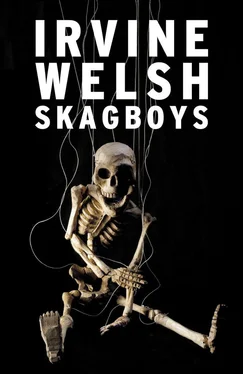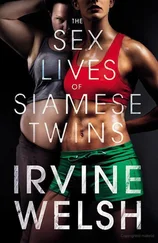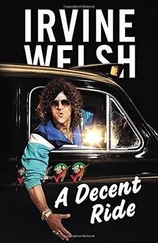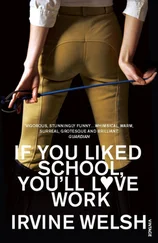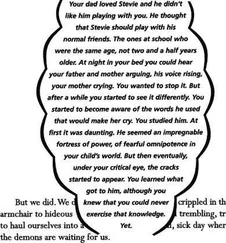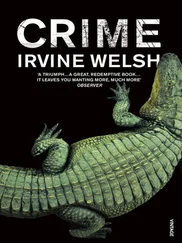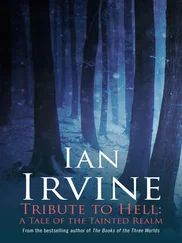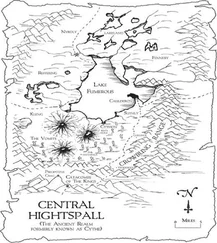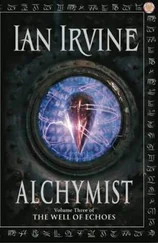Johnny had wandering hand trouble and had tried to feel her up in the night. Through her befuddled narcotic and emotional confusion, she’d sprung to animation and told him to fuck off; she wasn’t that blootered. Then he’d begged her so much for sex, to the point where Alison almost felt like she was the abuser for refusing to fuck him. For a second she’d almost relented, just to shut him up, before it dawned on her exactly how horrible that would have been on every level. Eventually, he gave up and left her, grumbling his way back to the bedroom.
Leaving in the early-morning light, she’d returned to her Pilrig flat, showered, then staggered up to her new job, and the conference at the City Council Chambers.
During her mother’s long illness, Alison had grown used to filling her life with distractions. The Edinburgh Women’s Poetry Group was a good one. It had the added advantage of being a male-free zone. She’d gone along to the EWPG with her mate Kelly, till the latter’s boyfriend Des felt threatened and, through his sneering derision, put a stop to her friend’s involvement. It wrecked her head to see Kelly, such a happy and outgoing soul, develop this brittle exoskeleton when Des came into the company. It was the refuge she’d habitually slither into, from where she’d hang on every inconsequential word that came out of his mouth. Still, that was her choice, and Alison’s had been to keep going to the poetry group.
She wasn’t enamoured with all the girls there. Plenty had an obvious sexual agenda, while a few really hated men, generalising from their personal bad experiences. But Alison could tell some hadn’t internalised the lesson, and were thus destined to find their next equivalent, the misogynistic semi-alcoholic who brooded bitterly from the bar stool about the last bitch who’d taken him to the cleaners. There was a Des for every one of those girls; it really was such a pity he was with Kelly. Then there were those that Alison considered the worst members of the group: the ones who actually thought they were decent poets.
Most of the women, though, Alison liked. It had been an experimental time in her life. She learned a little about verse structure and haikus, and that after going to bed with this girl called Nora, she could never be a lesbian. When Nora went down on her it was enjoyable for a bit, but then Alison had started thinking, Right, fair enough, but when’s the fuckin tadger comin along? But obviously it wasn’t and she’d started to feel irritated and tense, like she was wasting her time. At least Nora wasn’t selfish cause she got the message, lifting her head out the turf, conceding, ‘This isn’t really working out for you, is it?’ Alison had to confirm it wasn’t. And she felt bad that she wasn’t moved to reciprocate: Nora’s somewhat heavy, musky scent had made her think of her own menstruation.
Nora was nothing if not persistent, however, and the next week she told Alison she had ‘a solution tae our problem’. Couching it in those terms was disconcerting enough, but Nora had brought a dildo round, a strap-on. It was certainly formidable, but when she’d attached it to herself Alison had instantly erupted in laughter. Then she was besieged by the notion that if a dildo could crumble into a semi, then by Nora’s expression you’d have thought that had just happened. But she tried and Alison could say, hand on heart, that she didn’t have a sapphic bone in her body.
As she entered the oak-pannelled Chambers, weighed down by the close heat from outside, Alison was set on edge by the presence of all those busy, purposeful bodies and the foul waft she caught rising from her own armpits, in spite of the attention of both shower and roll-on deodorant. Yuck. Drug and alcohol sleaze. You keep washing it away. It keeps coming back .
She made her way to the back of the two-thirds-full hall and sat down. Her new boss, Alexander Birch, was heading to the podium, positioning himself behind the lectern. With his light grey suit, and hair fashionably styled, Alison found herself disconcertingly impressed by her new boss. He had a gay man’s grooming, but with the slightly combative edge of the sporty heterosexual.
— I’m Alexander Birch, and I was drawn to working with trees for some reason that eludes me, he began, to the inevitable polite laughter. He’d long since learned to use the potentially embarrassing coincidence of surname and profession as a business tool. Allowing the mirth to subside, he then restarted, steely-eyed and deadpan. — I don’t want to sound melodramatic, he looked around at the quieting, settling mass of bodies, — but I’m here to talk about a terrible plague that threatens to change our beautiful city beyond all recognition.
The rustling abruptly stopped, and he had everybody’s attention, even Alison’s, who was wondering if such irony was sailing a little close to the wind.
Her view was quickly revised when Alexander’s longish face remained set in earnest concentration over a slide projector. He clicked on the frontal view of a dark-looking insect. With its extended legs, it seemed to be challenging all in the room to a square-go. — This is the elm bark beetle, or Scolytus multistriatus . This creature spreads a fungal disease fatal to all elm trees. In an attempt to stop the fungus from spreading, the elm responds by plugging its own tissue with gum, which prevents water and other nutrients getting to the top of it, and then it starts to wither and die.
He isnae jokin!
Again the drum spun, sending a second slide clicking onto the screen. It showed a tree yellowing from the top down. — The first symptoms of infection are the tree’s upper branches beginning to wither and shed leaves in the summer, giving the diseased tree an unseasonal autumnal hue, Alexander solemnly explained. — This spreads south, eventually going into the roots of the tree, which subsequently atrophy.
Alison had settled down in her seat at the back of the Chambers. Crossing her legs, she sidetracked herself with carnal thoughts, which came easily in the squalid hangover and, indeed, was the only way to eke any enjoyment from it.
Going south. To the root .
Then suddenly, with an involuntary shudder, she wondered what they could do with her mother. The tests. More chemo. Would it work this time? Probably not. Would they take her to the hospice, or would she die at home, or in a hospital?
Mum …
Her breath caught. In panic, she pulled raggedly on the stale hot air in the room. A sequence of slides flashed up, some cityscape shots of Edinburgh, ranging from the recognisable Princes Street Gardens and the Botanics, to the hideaway corners of the city. — Edinburgh is a city of trees and woods; from the magnificence of the natural woodlands at Corstorphine Hill or Cammo, to the huge variety of splendid specimens in our parks and streets, Alexander argued, a pleasing flourish to his rhetoric. — Trees and woodlands have an inherent biodiversity value, whilst providing opportunities for recreation and environmental education. Our objective is to maintain a multi-aged treescape with a wide range of species that will achieve a balance of the physical, economic, social and spiritual needs of the city. Edinburgh has over twenty-five thousand elm trees: they are an integral part of our city’s treescape.
As Alexander looked around at the forest of faces in the audience, Alison visualised her new boss as a little boy lurking hesitantly on the edge of the woods. There was nothing shrinking about him though, as he went on: — Failure is not an option. We’ve lived with this nightmare since it was discovered here back in 1976. We’ve already lost 7.5 per cent of our elms. Now we have to intensify our efforts on sanitation felling, even if it means accepting that we’re now moving into a post-elm Edinburgh.
Читать дальше
